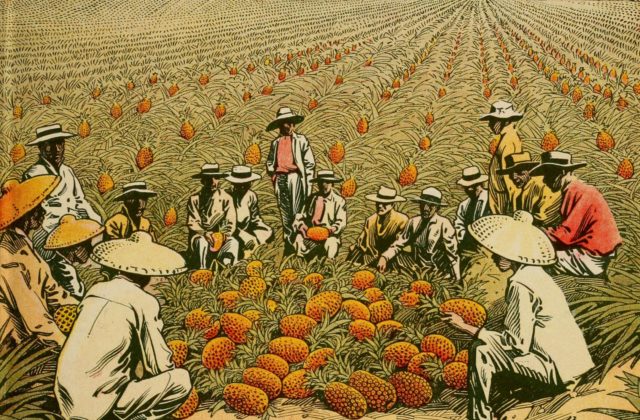
Commodity Frontiers and the Making of Global Capitalism
Year Group 2018/19
This theme group aims to provide a long historical perspective on problems that are often assumed to be modern, recasting our thinking about issues of sustainability, resilience, and crisis and thus contribute to the politics of our own times.
The theme group at NIAS is embedded in an interdisciplinary and an intersectoral research network that has been established by Sven Beckert (Harvard University), Ulbe Bosma (IISH/VU) and Eric Vanhaute (Ghent University), and which carries the name “Commodity Frontier Initiative (CFI)”. The Commodity Frontiers Initiative is a network of individual scholars, research teams and non-governmental organizations from all over the world. The Commodity Frontiers Initiative aims to systematically catalogue, study and analyze a wide variety of commodity frontiers over the past 500 years. Commodity frontiers are sites of cultivation of commodities like wheat, sugar cane, tobacco, cocoa, coffee, and cotton, as well as sites of extraction such as forests, marine zones, and mines. The ambition is to understand the role of the countryside and its people in the history of capitalism through a large multi-year research collaboration that combines local in-depth studies with innovative digital technologies.
The three initiators of the network are currently writing monographies that will hopefully become major interventions in their field. Beckert is writing a monography on the history of capitalism, Vanhaute a global history of the peasant and Bosma a global history of sugar. They all three have been working extensively on global commodity production, rural societies, labour history and the history of capitalism, and have published some of the most important books in the field.
More about the Commodity Frontiers Initiative
By launching the “Commodity Frontiers Initiative” they are bringing together experts on a wide range of global commodities, covering all the principle producing regions of the world, from the early modern period to the present day, employing a range of approaches, including social and economic history, anthropology, economics, sociology, political science, ecology and development studies. The CFI’s objective is to understand how the world’s countryside has changed in the history of capitalism through an integrated and inter- and transdisciplinary research design that combines local in-depth studies with innovative methodologies such as the creation of large data hubs, data visualization and mapping. Over the past few years this network has organised three public workshops: Harvard (2014), Amsterdam (2015), London (2016) and Dubai (December 2017).
The Commodity Frontier Initiative is born out of concern that the current mainstream conceptualisations of ‘sustainability’ and ‘resilience’ lack an understanding of the unequal, uneven and deep historical rootedness of our current global economy. This problem obviously has a variety of causes, but some are clearly related to the way in which knowledge production has been organized over the past decades. Economic historians, development economists, political ecologists, anthropologists, geographers and the like are working from their own disciplinary angle and from their own ontologies and consequently produce fragmented knowledge. One of the important and regrettable consequences is that the historical dimension has almost vanished from the field of development studies, which becomes immediately visible when one compares for example issues of the Journal of Development Studies of fifty years ago with today. The establishment of the Commodity Frontiers Initiative in itself is therefore already a major step towards re-integrating history in development studies, and the removal of boundaries between disciplinary approaches.
We argue that the concept of commodity frontiers is an important contribution to a long-term and transdisciplinary perspective. We define commodity frontiers as processes of dynamic incorporation of new sites of natural resources in the world economy. These processes pertain to the cultivation of commodities like wheat, sugar cane, tobacco, cocoa, coffee, and cotton, as well as the extractive frontiers of forests, marine zones, and mines. The Commodity Frontiers Initiative pursues the development of an inductive method in which localised experiences and global systemic movements are studied in a heuristic, bottom up way. This requires an integrated and genuine interdisciplinary research design that combines historical and contemporary expertise, and local in-depth studies, archival and field work with innovative methodologies such as large data hubs, Linked Open Data technology and visualisation and mapping techniques. Both the commitment and expertise are present in the current network, but it requires careful and sustained thinking to determine how to translate these desiderata into a concrete and coherent research agenda. Moreover, it is important to open up possibilities of co-creation with non-academic organisations, and to reach out to a wider academic and a public audience.







